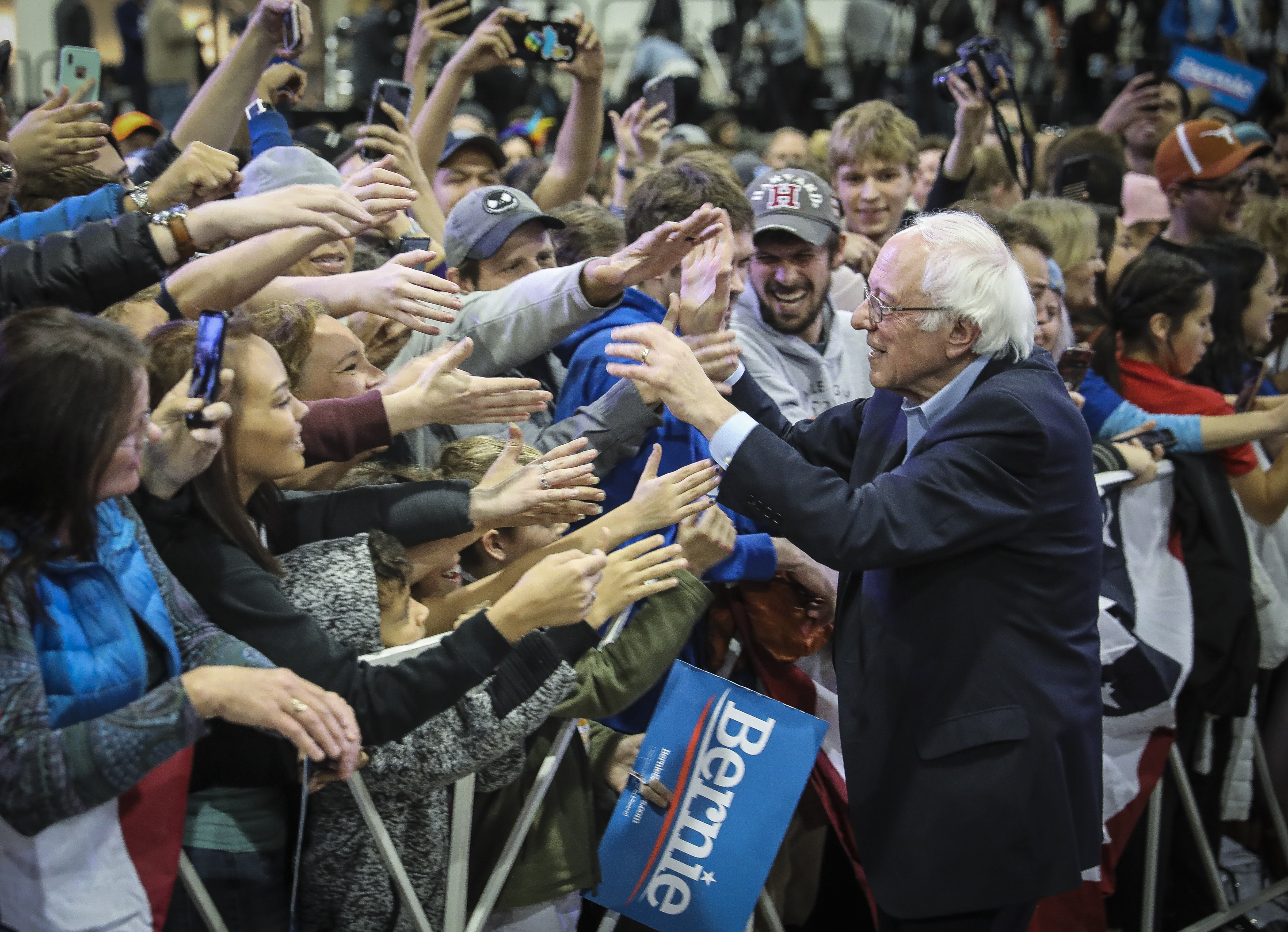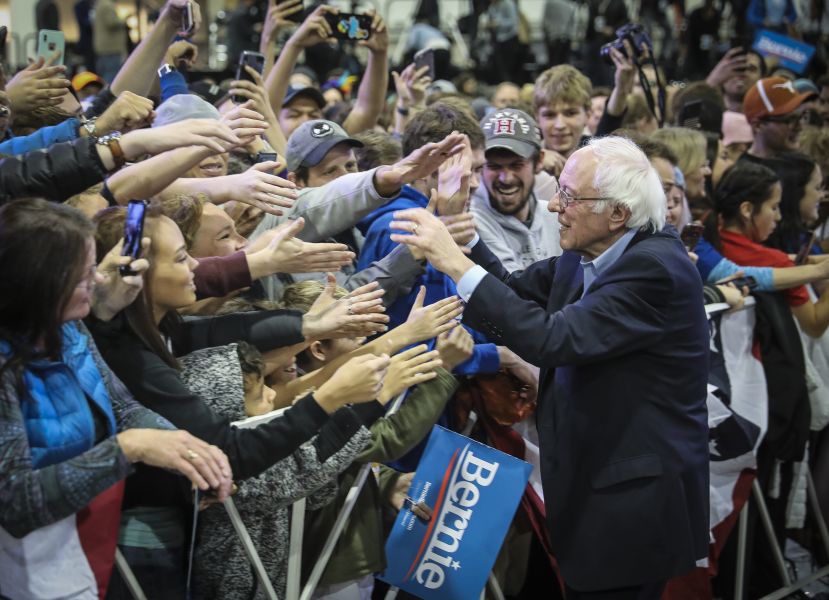I’m writing this newsletter more than a little bit tired, but extremely thankful to be safe. I live just south of Nashville in Franklin, Tennessee, and my neighbors to the north of me experienced a hellish night. Tornadoes touched down across Middle Tennessee, including in the heart of Nashville. The death toll is heartbreaking, and the physical devastation is unreal. Here’s a drone flyover of just one neighborhood:
It’s tough to transition from a natural disaster to presidential politics, but it’s Super Tuesday, so I must. Today’s French Press will focus on a topic near and dear to my heart: exploring what’s really at stake in the presidential election.
Let’s start with a piece in The Atlantic by Ronald Brownstein. It’s called the “Sixty Trillion Dollar Man,” and it takes a close look at the cost of Bernie Sanders’s various “democratic socialist” policy proposals. The bottom line is right in the title. The cost of Bernie’s proposals over 10 years is staggering. Here’s how Brownstein adds up the math:
-
$16.3 trillion for a Green New Deal, to accelerate the transition to a carbon-free economy;
-
$1.5 trillion to provide universal pre-kindergarten and child care;
-
$2.2 trillion to provide tuition-free public college and university, and to forgive all student debt;
-
$2.5 trillion to build affordable housing and reduce homelessness;
-
$81 billion to write off all medical debt;
-
a proposal to increase Social Security benefits (which Sanders did not provide a cost estimate for, but which other analysts have put at costing as much as $1.4 trillion); and
-
his Medicare for All plan, whose 10-year cost estimate in new federal spending ranges from just less than $31 trillion (from the nonpartisan Committee for a Responsible Federal Budget) to $34 trillion (from the center-left Urban Institute).
To put this in perspective, Sanders is proposing at least doubling the federal budget. Even if large parts of this increase are deficit-financed, paying for even part of his programs would require large-scale tax increases, and not just on the wealthy.

There are two ways to look at this policy menu: the Twitter way or the real way.
Here’s the Twitter way: It’s capitalism vs. socialism in the 2020 primary, and if Bernie wins the nomination, the very nature of the American economy is at stake!
Here’s the real way: None of this is happening. Not one of the truly massive programs will make it through Congress, and even his smaller programs will pass only if they’re scaled down.
Let’s break this down as simply as possible. First, even if Bernie wins, his coalition will not be united around that agenda. Millions of people will be voting against Trump as much or more than they’re voting for Bernie. The red-rose revolutionaries represent only a fraction of the American electorate.
Second, the reasonable best-case scenario for Democrats is a narrow presidential win and a narrow Senate victory. To enact that agenda, Sanders would be asking precarious red and purple-state Democrats to turn their backs on their more-moderate constituents to both get rid of the legislative filibuster and pass the most ambitious government expansion in peacetime history—all before the next midterm election.
Third, recent history demonstrates the difficulty of revolutionary change. Barack Obama rolled into his presidency with the largest victory margin in the last 20 years, an enormous amount of public good will, enjoyed a filibuster-proof majority, and faced a demoralized political opposition. Even with all those advantages, he passed a stimulus and Obamacare—and then Obamacare promptly killed his House majority.
Consider Donald Trump. He rolled into office with majorities in the House and Senate, faced a shocked and demoralized opposition, and his chief legislative accomplishment is a standard, establishment Republican tax cut. There is no prospect for any serious legislative accomplishment in his second term.
This track record indicates that in polarized America even presidents who command legislative majorities get very limited bites at the legislative apple, and the more extravagant the promise, the less likely its fulfillment.
To be clear, this doesn’t mean that presidents aren’t important. It just means that presidents alone cannot revolutionize our nation’s economy or its laws. They can often nudge, but they can rarely shove. They can push defense budgets up or down. They can use regulations to move environmental, education, or immigration policy modestly left or right. They can appoint judges, but even a judge-appointing machine (like the Trump-McConnell juggernaut) can have only limited impact over any given four-year span. The next president can balance the judicial ledger.
Even the efforts to nudge are often bitterly contested. Promulgate regulations or craft executive orders, and you’ll not only face immediate resistance in court, the next president will repeal your most aggressive efforts. Regulations and executive orders often become legal vaporware. They’re often useful for signaling your legal intent, achieving modest short-term results, and satisfying your political base, but unless your party discovers the key to perpetual victory, regulatory change is guaranteed to last only as long as your party runs the White House.
This leaves foreign policy—the area where the president exercises the most control, and the public (absent a crisis) cares the least.
But there’s something else lurking in the backdrop of American politics, a systemic problem that is producing its own strains on our system. American political deadlock is creating a toxic cycle of frustrated ambitions and partisan blame. Politicians sell an unrealistic vision to their base, and then when the unrealistic vision faces its inevitable demise, these same politicians blame their partisan opponents for frustrating the “will of the people.”
If Bernie wins in 2020, his base won’t blame him for promising what he can’t deliver—just as Trump’s base doesn’t blame him for failing to produce a wall billed to Mexico. The cycle of hope and hate continues. Our leader gives us hope. We hate the opposition for standing in their way. But in each case, politicians are doing what they were elected to do.
I’m reminded of the lingering fury over the thwarted nomination of Merrick Garland. The Democrats felt a justified sense of outrage—after all, Barack Obama won his election. Isn’t he constitutionally entitled to nominate judges for the Supreme Court? The Republicans felt their own justified anger—Republican senators won their elections. Aren’t they constitutionally entitled to reject Democratic nominees?
Make no mistake, absent an unexpected, tectonic shift from the top to bottom of American politics (and not merely Bernie’s victory) Bernie’s $60 trillion dream is going to die. It might die tonight, if Democratic voters turn decisively to Joe Biden. It might die in November, if Trump beats Bernie. It might die months later, as Bernie’s revolutionaries fail to persuade a reluctant public to transform the American economy and significantly increase their tax burdens.
But it willdie, and when it dies it will leave yet another significant slice of the American public angry and bitter over their broken political dreams, and the last person they’ll blame is the person who sold them hope that he should have known was false from the beginning.
One other thing …
Writing in Time today, I take a look at President Trump’s deal with the Taliban. I’m not impressed. In some ways it’s worse than simply pulling up stakes and leaving. Read its terms closely, and you’ll see that the Trump administration actually agrees to try to strengthen the Taliban through prisoner releases and sanctions relief:
If you read the peace agreement itself, you’ll note immediately that it gives the Taliban a series of concrete, measurable gifts. First, there’s an immediate allied withdrawal—down to 8,600 American troops (and proportionate numbers of allied troops) within 135 days. The remainder of American and allied forces will leave within 14 months.
At the same time, the United States will immediately and substantially reinforce the Taliban by seeking the release of 5,000 Taliban prisoners by March 20. Even worse, the United States further agreed to a goal of “releasing all remaining prisoners over the course of the subsequent three months.” It will do this at the same time that it commits to the “goal” of removing sanctions from members of the Taliban that include travel bans, asset freezes, and an arms embargo.
The combination of the planned American retreat and the planned prisoner release would represent a substantial change in the balance of forces in Afghanistan. This would come without any agreement by the Taliban to cease hostilities against our allies.
This is a deal that would make Republicans livid if it came from a Democratic president, and they’d be right to be angry. There is a difference between peace agreement and retreat — and (as I say in the piece) debates about “endless war” all too often presume that our conflicts with jihadists can end on our command. They cannot. If jihadists do not choose to lay down their arms, our best efforts to end America’s long conflict will come to naught. Indeed, our very effort to extricate ourselves from these conflicts can end up bolstering our enemies and harming our national security.
One last thing …
As I’m sure you’re aware, not only are my Memphis Grizzlies still shocking the basketball world by clinging to the eighth seed in the West, they just soundly beat the Lakers at FedEx Forum. Oh, and Ja Morant almost ended Anthony Davis’s career with the most humiliating dunk in league history. Almost, but not quite:
Photograph of Bernie Sanders at a rally in Colorado by Marc Piscotty/Getty Images.






Please note that we at The Dispatch hold ourselves, our work, and our commenters to a higher standard than other places on the internet. We welcome comments that foster genuine debate or discussion—including comments critical of us or our work—but responses that include ad hominem attacks on fellow Dispatch members or are intended to stoke fear and anger may be moderated.
You are currently using a limited time guest pass and do not have access to commenting. Consider subscribing to join the conversation.
With your membership, you only have the ability to comment on The Morning Dispatch articles. Consider upgrading to join the conversation everywhere.